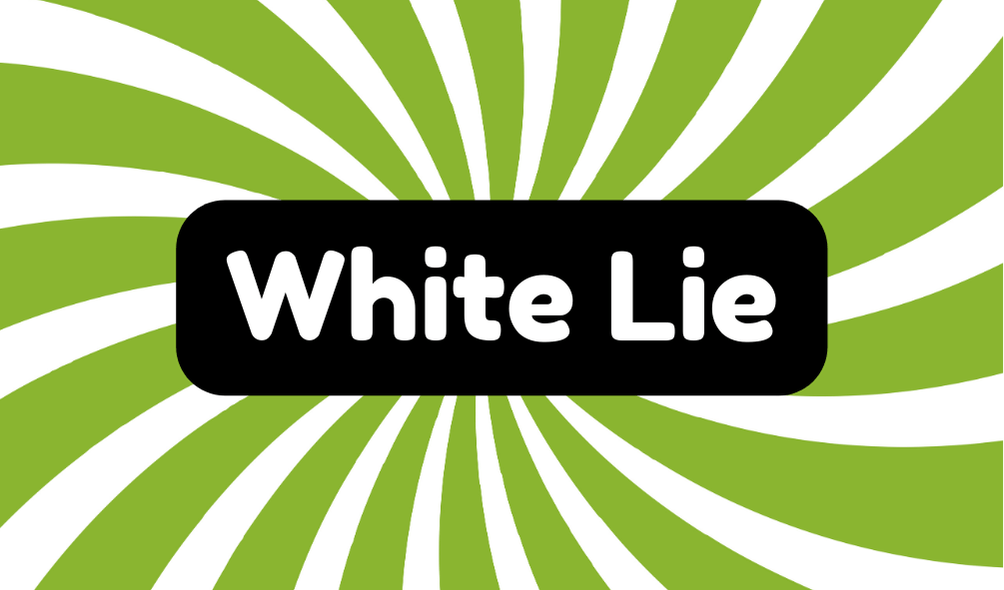A white lie refers to a minor falsehood told to avoid hurting someone's feelings or to maintain social harmony. The term emerged in the 1740s, reflecting societal values of kindness and purity in communication, though recent critiques suggest it may carry problematic implications. Common examples include lying about an unappealing outfit or assuring a child that a lost pet will return. While some see white lies as necessary for social grace, skepticism exists regarding their potential to erode trust. Understanding their use in everyday life offers insight into both interpersonal dynamics and evolving communication ethics. More complexities await your exploration.
Synonyms
Identifying synonyms for "white lie" helps to illuminate the concept's nuances in communication. While often perceived as harmless, these statements reveal more complex cultural interpretations of dishonesty. Unpacking this provides insight into how societies navigate honesty and deception.
- Fib: A minor untruth often told to avoid hurting others' feelings.
- Prevarication: A more formal term that suggests deceit without serious intent.
- Bend the truth: A colloquial phrase indicating a slight alteration of facts for a kinder outcome.
Understanding these synonyms enables a deeper examination of our communication ethics. It raises questions about acceptable boundaries in truth-telling, challenging the notion that all forms of dishonesty—even the trivial—are universally justified or benign.
Example of Sentences
How do white lies manifest in everyday interactions? They often surface in social situations where individuals face ethical dilemmas between honesty and kindness. For instance, adhering to social norms, people might opt for white lies to maintain peace. Consider these examples:
- Complimenting a friend's outfit that is unappealing to avoid hurting their feelings.
- Indicating that you're busy to decline an invitation politely rather than explaining a lack of interest.
- Telling a child that a beloved pet will return soon to ease their anxiety.
While such fabrications may seem harmless, regular use can lead to misunderstandings and frustrations, challenging the very foundation of trust and authenticity in relationships. Consequently, the implications of white lies warrant careful consideration.
Origin
Emerging in the 1740s, the term "white lie" reflects societal attitudes towards small, seemingly innocuous falsehoods tied to notions of purity and kindness. Its historical background reveals a linguistic evolution from earlier concepts of innocence in deceit, with roots traceable to a 14th-century letter. Initially associated with harmless intent, the term colors our perception of minor untruths, implying that some fabrications serve greater good. However, recent critiques suggest that invoking "white" in this arena risks unintended racial connotations, complicating its meaning. As we navigate the ethical landscape surrounding white lies, it is essential to recognize their dual potential for kindness and deception, urging a more nuanced understanding of their impact on relationships and honesty in society.
Collocations
What types of expressions commonly accompany the concept of a "white lie"? Understanding the collocations relevant to this notion reveals insights into white lie etiquette and cultural variations surrounding its practice. Common expressions include:
- Tell a white lie – indicating the act of sparing someone's feelings.
- White lie for kindness – emphasizing the intention behind the deception.
- Acceptable white lie – highlighting the societal agreement on harmless dishonesty.
While some assert that these collocations promote a benign approach to communication, it's essential to remain skeptical about their implications. Cultural variations can lead to misinterpretations, and normalization of white lies might reduce the value placed on honesty. Consequently, while often deemed harmless, white lies warrant critical examination in diverse social contexts.
How to Use in Everyday Language
Although many people may feel conflicted about honesty, incorporating the notion of a white lie into everyday language can offer a practical approach to communication. In various everyday situations, understanding cultural nuances becomes essential; what may be deemed acceptable in one culture could be offensive in another. Using white lies sparingly can help navigate social interactions without causing unnecessary discomfort. For instance, complimenting a friend's outfit, despite personal reservations, can foster goodwill rather than conflict. However, one must remain cautious, as this practice could pave the way for greater dishonesty over time. Balancing kindness with honesty is fundamental, ensuring that the intent behind the white lie is genuinely to uplift, not manipulate, in our nuanced interpersonal exchanges.
Why Is It Still Relevant Today?
In an increasingly complex social landscape, the relevance of white lies persists as a pragmatic tool for maintaining harmony in interpersonal relationships. Their cultural significance can be observed in various settings, often viewed as a small sacrifice to prevent discomfort. However, the modern implications of white lies require critical scrutiny. While they may seem harmless, these fabrications can insidiously erode trust, reshaping relationships in unforeseen ways. As society grapples with escalating demands for transparency, the balance between honesty and kindness grows ever more delicate. Consequently, understanding the dual nature of white lies—serving both protective and potentially harmful roles—encourages a more informed engagement with honesty in contemporary interactions, emphasizing the need for thoughtful communication in our everyday lives.
Frequently Asked Questions
Are White Lies Always Considered Harmless?
White lies are not always harmless; they can lead to trust issues and communication breakdowns. While aimed at preserving feelings, habitual dishonesty may inadvertently erode relationships, highlighting the need for transparent and empathetic communication.
How Do Cultural Differences Affect Perceptions of White Lies?
Cultural differences profoundly influence perceptions of white lies, as social expectations dictate acceptable behaviors. While some cultures endorse these minor deceptions to enhance interpersonal relationships, others may prioritize honesty, raising interesting questions about evolving cultural norms.
Can White Lies Lead to Serious Consequences?
Yes, white lies can lead to serious consequences, including trust erosion and moral ambiguity. While often intended to protect feelings, such deceit may undermine honest communication and create complex ethical dilemmas within personal relationships.
What Is the Psychological Impact of Telling White Lies?
Telling white lies can trigger guilt feelings, potentially leading to trust erosion in relationships. While intended to protect, these seemingly innocent fabrications may undermine authenticity, sparking deeper psychological dilemmas that warrant careful consideration and innovation in communication strategies.
Managing white lies ethically involves maintaining a trust balance while setting honesty boundaries. Emphasizing empathetic communication fosters innovation in relationships, enabling partners to address sensitive issues without compromising genuine emotional connections or mutual respect.







